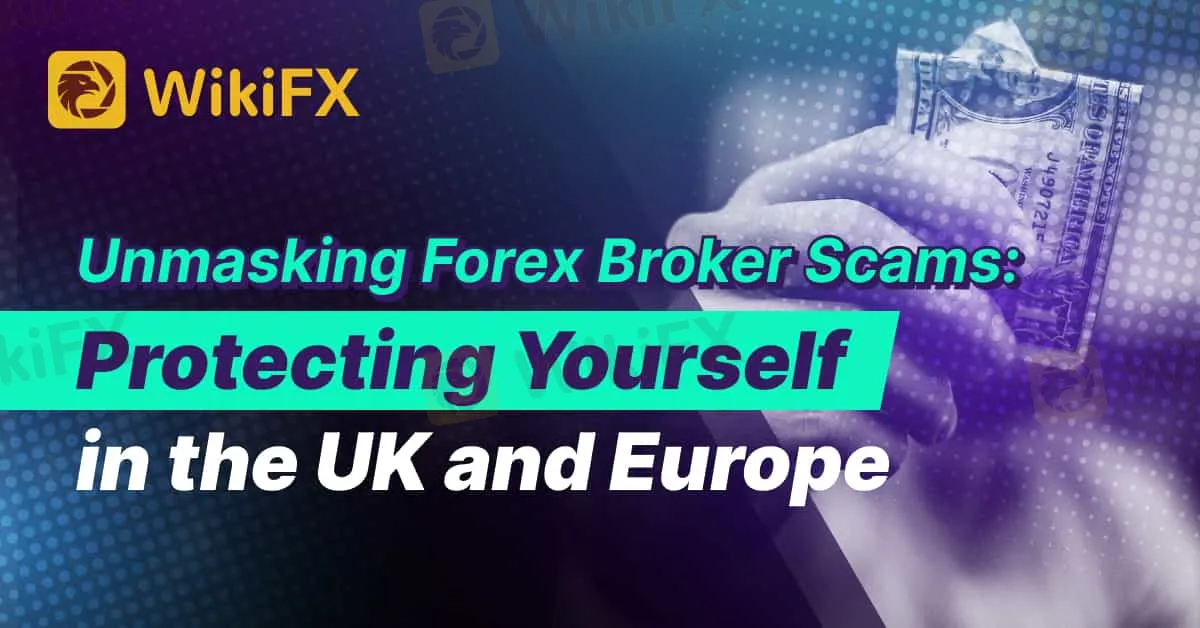简体中文
繁體中文
English
Pусский
日本語
ภาษาไทย
Tiếng Việt
Bahasa Indonesia
Español
हिन्दी
Filippiiniläinen
Français
Deutsch
Português
Türkçe
한국어
العربية
Unmasking Forex Broker Scams: Protecting Yourself in the UK and Europe
Abstract:While the Forex market offers vast opportunities for traders, it is essential to be aware of potential scams perpetrated by unscrupulous brokers. This article sheds light on the various ways brokers have been reported for scamming their clients, emphasizing the importance of due diligence. Throughout this article, we will mention WikiFX, a platform that helps traders identify reputable brokers and avoid falling victim to scams.

Introduction:
While the Forex market offers vast opportunities for traders, it is essential to be aware of potential scams perpetrated by unscrupulous brokers. This article sheds light on the various ways brokers have been reported for scamming their clients, emphasizing the importance of due diligence. Throughout this article, we will mention WikiFX, a platform that helps traders identify reputable brokers and avoid falling victim to scams.
Common Broker Scam Techniques:
Unfair Trade Execution: Some brokers manipulate trade execution to their advantage, causing slippage or requotes that harm the trader's profitability.
Misleading Advertising: Brokers may use deceptive advertising practices, promising unrealistic returns or hiding important terms and conditions.
Unauthorized Withdrawals: Scam brokers might refuse to process withdrawal requests or make unauthorized withdrawals from clients' accounts.
Account Manipulation: By artificially adjusting prices or tampering with trading conditions, brokers can negatively impact traders' results.
Ponzi Schemes: Certain fraudulent brokers operate as Ponzi schemes, using funds from new clients to pay profits to existing clients, thus creating a false impression of success.
Using WikiFX to Avoid Scams:
WikiFX provides a comprehensive database of brokers, allowing traders to research and evaluate their legitimacy. By checking a broker's profile on WikiFX, users can access vital information such as licensing, regulatory status, and user feedback. This platform empowers traders to make informed decisions and avoid falling victim to broker scams.

Disclaimer:
The views in this article only represent the author's personal views, and do not constitute investment advice on this platform. This platform does not guarantee the accuracy, completeness and timeliness of the information in the article, and will not be liable for any loss caused by the use of or reliance on the information in the article.
Read more

Anti-Scam Groups Urge Tougher Action on Fraudsters in UK
Anti-scam groups demand tougher police action on fraudsters as UK fraud rates surge 19%, targeting millions in a penalty-free crime spree exposed by a $35m scam leak.

Philippines Deports 29 Indonesians Linked to Online Scam Syndicate in Manila
Online scam groups in the Philippines trick Filipinos into gambling and love scams, from Manila to Bacolod, causing trafficking and pain as police fight back.

CySEC Warns Against 14 Unlicensed Investment Websites
CySEC urges caution as 14 websites lack proper authorization.

Couple Arrested in Thailand for Billion-Baht Crypto Scam & International Kidnapping
Thai authorities have announced the arrest of 27-year-old Chinese national Wu Di, who is believed to be at the centre of a large-scale cryptocurrency investment scam that has defrauded victims of over 600 million baht (approximately US$17.7 million) within a span of just two months.
WikiFX Broker
Latest News
How Crypto Trading Transforms FX and CFD Brokerage Industry
UK would not hesitate to retaliate against US tariffs - No 10 sources
FCA Warns Against 10 Unlicensed or Clone Firms
CySEC Warns Against 14 Unlicensed Investment Websites
Top Currency Pairs to Watch for Profit This Week - March 31, 2025
Will natural disasters have an impact on the forex market?
Philippines Deports 29 Indonesians Linked to Online Scam Syndicate in Manila
Navigating the Intersection of Forex Markets, AI Technology, and Fintech
Exposed: Deceptive World of Fake Trading Gurus – Don’t Get Fooled!
AI-Powered Strategies to Improve Profits in Forex Trading
Currency Calculator







